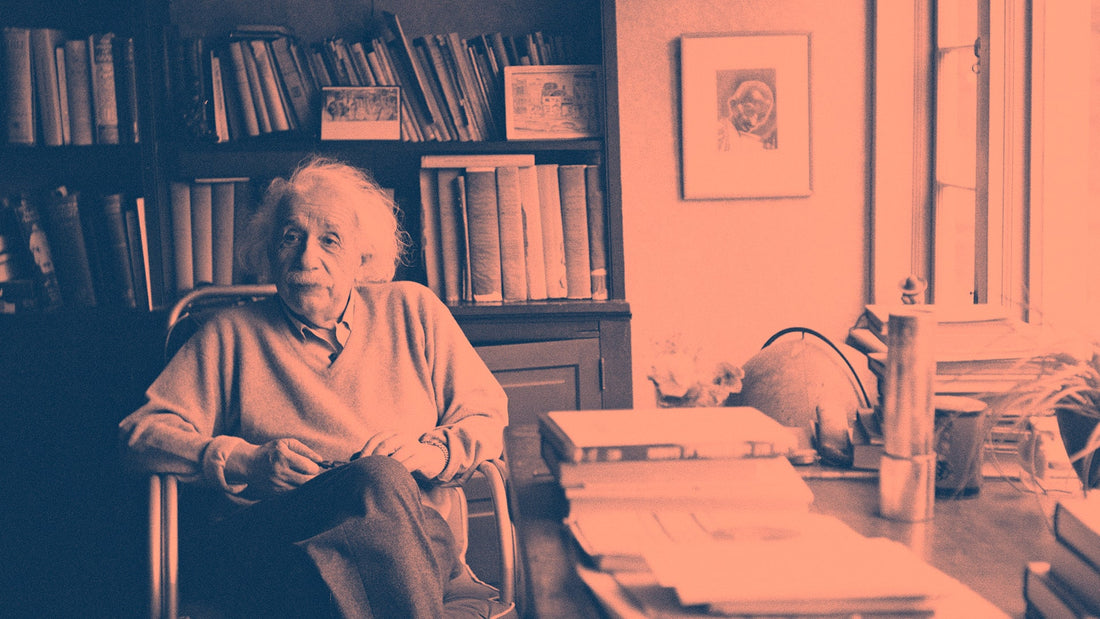Einstein's Law of Focus: How to Be More Productive, Accomplished, and Fulfilled, Starting TodayAccording to Einstein, what you decide not to do can make all the difference.
After Albert Einstein graduated from college in 1900, he struggled to find work as a teacher and took a job at the patent office. (Even Einstein had to start somewhere.) He used that job, in time-honored, dues-paying tradition, to cover the bills while he published four groundbreaking scientific papers and earned his PhD in 1906.
By 1912, he was widely known -- at least within the scientific community -- as an accomplished theoretical physicist. Big fish? Sure, but in a really small pond.
So he took a step back and assessed his career. Generally speaking, he was, um, a generalist. What if he focused on one thing? What if he applied non-Euclidian math to his own work on general relativity so it accounted for the effect of gravity? For the next three years, that's what he did. That's all he did. (He later claimed his hair turned white from the stress.)
In 1915, he published his theory of relativity, arguably the greatest scientific accomplishment of the 20th century.
Einstein's Law of Focus
As Cal Newport, author So Good They Can't Ignore You (a book I've given to at least 50 people over the years), writes:
Einstein's push for general relativity highlights an important reality about accomplishment. We are most productive when we focus on a very small number of projects on which we can devote a large amount of attention. Achievements worth achieving require hard work. There is no shortcut. ... Effort, sustained over a long amount of time, is required.
In a perfect world, we would all be Einsteins. We would each have only one, or at most two, projects in the three major spheres of our lives: professional, extracurricular, and personal.
Granted, that's not easy. We all tend to be generalists, even if not by choice. (Starting your own business means wearing many hats.)
Career, family, friends, personal pursuits -- our buckets are full of disparate tasks. So are our bucket lists.
As a result, as Newport writes:
We can no longer focus on a small number of important project, but find ourselves, instead, rushing between an increasingly overwhelming slate full of a variety of obligations. This time fracture can prevent real accomplishment.
Imagine if Einstein maintained a blog, wrote a book, joined a bunch of clubs, and tried to master rowing at the same time he was working on general relativity?
We'd still be living in the age of Newton.
Newport's solution?
- Step 1: Create three columns: professional, personal (family, friends, etc.), and extracurricular (side projects, personal goals, etc.). List everything you're doing in each category.
- Step 2: Choose one or two items from each list that are the most important (and hopefully also provide the greatest return), and put a star beside them.
- Step 3: Identify items that you could stop doing, today, without suffering any real consequences, and cross them out. Think of this step as pruning.
- Step 4: Look at the unmarked items and create a one- to three-week plan to complete them (or escape from them). Maybe that will mean not working on the starred projects for a short period of time, but that's OK. Think of this step as weeding.
- Step 5: Focus on the one or two important things that remain in each category -- and be ruthless about not adding any new items to the list, at least for a while. Just work the list.
Eventually, you'll be unable to resist the temptation to take on new projects. Goal-scope creep is inevitable for people who expect a lot from themselves. Somewhere along the way, you'll have to go through the whole exercise again.
And that's OK, because it works.
Just ask Warren Buffett.
Buffett's Law of Focus
As Inc. colleague Justin Bariso writes, Buffett walked pilot Mike Flint through a simple exercise:
- List his top 25 career goals, then
- Circle the top 5 goals
Buffett reportedly told Flint to focus solely on accomplishing goals 1 through 5, and completely avoid working on goals 6 through 25. (Justin calls it the 25/5 Rule.)
Why? You can't do 25 things well. (I can't do two things well.) Working on 25 things means getting very little done on any of them.
As Justin writes:
It's easy to come up with five things you really want to do. But it's even easier to get distracted from actually making progress on those five goals, because you get caught up in the excitement, the joy, the temporary pleasure of things that simply aren't as important.
Try it. List all your goals: professional, personal, and extracurricular. Pick the two most important in each. Cross out the ones that don't matter, or that are more imagined than actual. (If you claim you want to run a marathon, but you go for a jog only once every week or two, that's a dream, not a goal.)
Then create a plan to knock out the remaining items in each category. Or, if they're ongoing -- like wanting to spend more time with non-nuclear family -- create a plan to ensure that happens regularly.
And then put your head down and focus on the tasks, projects, or goals that really matter.
As Newport writes:
The productivity purge is a necessary piece of project gardening. By doing these regularly, you keep yourself focused on whats important. You get at least one month after every purge in which serious work gets done on a small number of projects.
It's during these focused months, when the Einstein Principle comes into play, that you'll end up making the progress on those activities that might end up becoming life changing.


3 comments
ozVAWCFBKL
pESLMezKTidBgc
KNFTciEYoSXbC